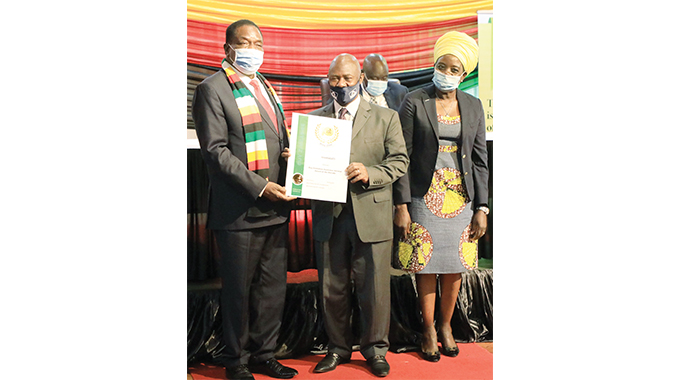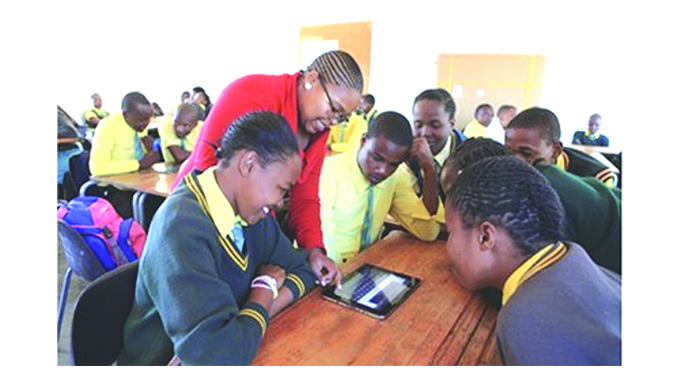Members of Parliament call for traditional medicine consideration

Thandeka Moyo-Ndlovu and Michelle Nyanzira, Health Reporters
MEMBERS of Parliament have called for the establishment of a specific fund to spearhead the adoption and mainstreaming of traditional medicine in Zimbabwe.
They also said the Government needs to consider availing land to grow medicinal herbs and also establish training institutions which will promote the use of traditional medicines.
Adopting these approaches, according to the legislators, will not only restore confidence in tradition medicines but will help Zimbabweans address the growing disease burden — a scenario that never existed during the olden times.
This follows ongoing debates on the efficacy of traditional medicines and home remedies in treating the deadly Covid-19 which has so far claimed the lives of 1 575 Zimbabweans.
From the outbreak of the pandemic last year in March, members of the public were forced to resort to steaming and use of wild herb umsuzwane and other herbs to increase their chances of not getting the virus.
The use of traditional medicines which has not been approved by regulatory authorities, has been blamed for the high number of people who defy Covid-19 regulations.
In her second report of the Portfolio Committee on Health and Child Care on the development and promotion of traditional and complementary medicines in Zimbabwe, Warren Park legislator Cde Precious Chinhamo Masango said traditional medicines were being used by many Zimbabweans.
She said it was time Zimbabwe considered the development and promotion of traditional and complementary medicines as the generality of citizens made them the medicine of choice during the lockdown period.
She said the Covid-19 pandemic has taught Zimbabwe to look inward and be self-reliant, not only in terms of local production of conventional medicines and drugs, but to consider promoting traditional and complementary medicines.
“Before the outbreak of Covid-19 virus, traditional and complementary medicines were being widely used in rural areas to treat various ailments such as diabetes, high blood pressure, cancers among others where conventional medical services are sometimes inaccessible or not affordable,” she said.
Cde Chinhamo Masango said although there was no scientific study in terms of the statistics on usage of traditional medicines, it is generally believed that home remedies and traditional medicines are highly used by citizens.
“Regarding the process of registering medicines in Zimbabwe, the Committee heard that applicants should submit applications with a fee of US$200 or ZWL equivalent to the Medicines Control Authority of Zimbabwe (MCAZ). Thereafter, MCAZ Secretariat receives, receipts and evaluates and finally the Complementary Medicines Committee approves the product,” she said.
“At the time of this enquiry, the MCAZ registered 234 traditional and complementary medicines and only two which is less than one percent, were local herbs and these are Mukwa and Moringa Powder.”
Cde Chinhamo Masango also said lack of funding for research on the efficacy, safety and adequacy of the existing and new indigenous and complementary medicines remains a challenge.
“Other challenges include unavailability of land that is earmarked for the cultivation of herbs and the negative attitudes towards the traditional medical practice from the media, churches, Government of Zimbabwe and society at large,” said Cde Chinhamo Masango.
The committee recommended that the Ministry of Finance and Economic Development should allocate funding to the traditional and complementary medicines in the 2022 National Budget to enable more research and development in this field.
It also called for cordial work relations between the traditional medicine practitioners and conventional medical practitioners which are an essential ingredient in boosting the development and promotion of the complementary medicines in Zimbabwe
Debating on the issue, Cde Perseverance Zhou from Chipinge called on Scientists to dig deeper and make research on these medicinal plants.
She said correct information must be relayed to individuals who consume these traditional medicines so that they do not overdose and do not consume poisonous plants.
“Covid-19 has acted as a reminder of our past, our historical background of medicinal plants that we used as people, as Africans. I am very thankful to all those who came through who taught us, informed and enlightened us with regard to the use of medicinal plants,” she said.
“The Ministry of Lands should engage universities especially institutions and establish plantations of medicinal plants. People should be taught the benefits that come with these plants,” she added.
MDC proportional representation legislator Mrs Priscilla Misihairabwi- Mushonga said it was important to take pride in using traditional medicines even during the Covid-19 era.
“No one has said why there are fewer Covid-19 deaths in Africa when everybody had predicted that with Covid-19, we would be finding dead bodies in the streets in Africa. That is what the Western media had fed us with, that we were going to die like flies. We have realised that in fact, it is in the West where more people are dying compared to Africa,” she said.
“Somebody should have really worked on trying to find out what is protecting us as Africa even with minimum health facilities. India is seen as the global hospital; it is the pharmaceutical centre but it has statistics of close to about 20 million Covid-19 infections as we speak right now. The United States has equally bad numbers but they have the infrastructure, medicines, doctors and nurses. So, something must have happened that got us protected from Covid-19,” said Mrs Misihairabwi-Mushonga.
She said the truth maybe hidden in unresearched details about the benefits of traditional medicines.
“When I was growing up I used to have serious period pains such that I would not be able to go to school for three to four days; dysmenorrheal is what they call it. If you went to a doctor, the first thing that they would tell you even when you were aged 14, was that you needed to be given family planning tablets,” she said.
“I just happened to have an uncle who was a herbalist and all I started doing was that I would get – ntolwane. So just before I went for my periods, I would take ntolwane and I never suffered from dysmenorrhea, yet today every other child that is having period pains is rushing to the pharmacy to get Panadol and stop pain which in certain circumstances is addictive and that for me is just a sign of how we have not been able to use the things that we are supposed to have.
Dzivarasekwa legislator Mr Edwin Mushoriwa said adopting traditional medicines is also another way to bring back Zimbabwe which still suffers the effects of colonisation.
“We have been competing to simply say we are the best in probably speaking English or doing other things that do not really add value. I know for a fact that for some of us, we are proud to take traditional medicine, traditional medicine does not necessarily mean that one has to go to a n’anga. Traditional medicine is out there; all our tradition has taught us that this tree, this shrub and this grass cures this and that disease,” he said.
“The mere fact that we have got a Ministry of Health in 2021 which does not allocate funds towards the budget for traditional medicine shows you that Zimbabwe is not yet in the World Health Organisation. We have not reached a stage as a country where we are proud of being Africans, where we are proud of our tradition and proud of being great Zimbabweans, we have not reached that stage,” he added.
Hurungwe Central legislator Cde Dought Ndiweni also said traditional medicines are so downplayed in Zimbabwe when they are so important for citizens.
“If you look at statistics in Zimbabwe, traditional medicines are used by almost two thirds of the population. Some of us use traditional medicines behind closed doors while others use it openly but statistics say two thirds of the population use traditional medicine,” he said.
“So, the problem that we are facing in Zimbabwe is we are not doing much in terms of research. We cannot blame the Government on this challenge that we are facing which is downplaying traditional medicines. Government has put in policies. Government has put the Traditional Healers and Traditional Medicines Act in place but what remains is how to operationalise these Acts.” — @thamamoe/@michieroxy.











Comments